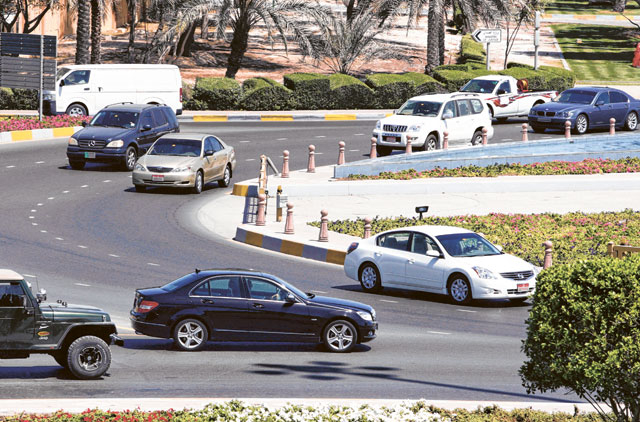There were a couple of stories in this paper last week on bad drivers and bad driving habits. It seems that the incidence of road bullying and road rage in the UAE has been rising to a noticeable level. While the Roads and Transport Authority have posted strict fines, it seems nothing thwarts those intent on bullying you off the highway as they tailgate you, flashing their lights or even blowing their horn to get you off the lane.
The situation is not much different in Saudi Arabia, a country gaining unwanted publicity with its high death toll on the kingdom’s roads and highways. Not a day passes without lives being claimed, some in double figures because of bad driving habits. Frustration against what people see a feeble effort by the traffic authorities to curb undisciplined drivers is evident in the number of letters and complaints in newspapers and on social media.
However, unlike the UAE where there is a stringent qualification process before a driving licence is issued, there is a growing belief that the qualification process for licensing drivers is part of the problem. They question whether the authorities have the right programmes, tests and examinations to ensure that all motorists fully comprehend road rules before licences are granted? Are the instructions clear and applicable to our conditions? Are testing centres manned by qualified and dedicated instructors and examiners, or staffed by individuals who rather be employed somewhere else?
At any given time there may be more than 40 different nationalities on the roads and behind the wheels. Does everyone behind the wheel know what the driving etiquette is? Is the language of instructions clear to everybody who sits in for a test? Do all those motorists issued driving licences know what the traffic laws are? Can they be blamed if issued a licence while still unqualified?
The people also fault traffic patrol officers for falling short of their responsibilities. They are referred to as the ‘invisible’ force as they seem to be in rare commodity. And if one is discovered, he would be most likely seen sitting idly in his patrol car on the side of the road with the beacon atop the roof flashing while cars whiz past, most breaking the posted speed limits. Rarely have I seen a patrol car flag down an offender unless the culprit was caught in broad daylight while speeding at more than twice the speed limit.
And then it is about the motorists themselves. Traffic violations are not simply confined to speeding, which has contributed to a disproportionate number of fatalities in the kingdom when compared to other countries. Among the most blatant and rarely rebuked violations are eight or nine year old boys driving the family car on a busy street, failure to stop at traffic lights when red, turning left from the extreme right lane in traffic, double and triple parked on the side of the road for a quick errand, using the highway shoulder for overtaking, driving with an infant on the lap, no seat belts, etc, etc. This is a collectively shared failure between us and the traffic authorities; As residents, we the public for not respecting traffic laws, and the traffic department for not enforcing them.
Some years ago, the Kingdom introduced Saher, also known as Automated Traffic Violations Administering and monitoring system (ATVAM). Highly accurate and calibrated cameras placed on road shoulders and intersections record a vehicle’s velocity, acceleration, and crossing of red traffic lights and record fines a wide range of fines on the offending vehicle licence plate. The director of Jeddah Traffic Police credited the advent of Saher with a reduction of road accidents by 36 per cent in his area of command.
But bad drivers are fighting back against this system. Some have resorted to covering their licence plates or disfiguring them to thwart the probing eyes of the cameras. Others slow down as they approach the cameras, only to floor the pedals once past. Some drivers have been more extreme. In 2012, a video uploaded on a social media site went viral, showing four Saudi youth actually gunning down a Saher camera while a patriotic song by the late singer Talal Maddah called ‘Watani Al Habeeb (My Dear Country)’ was being played in the background. In justifying their actions, one of the men said on camera: “We have bills and debts to pay.”
Even more disturbing was the incident revolving around a mobile Saher vehicle driver who was shot during the performance of his duties in 2010 by an assailant opposed to the system. He died in the attack and his vehicle was burned. Such criminal activity against any means of road monitoring is a very disturbing trend. Most are fuelled by the need for speed.
I often wonder whether the recent generation of drivers, many who initially learnt their driving skills playing racing games in arcades or through video games have any concept about the dangers of excessive speed. While it is fun to burn rubber and get into the occasional pileup on the screen, it is very different in real life.
For some the price is more than the cost of a video game. It is one’s life.
Tariq A. Al Maeena is a Saudi socio-political commentator. He lives in Jeddah, Saudi Arabia. Follow him on Twitter at www.twitter.com/@talmaeena











